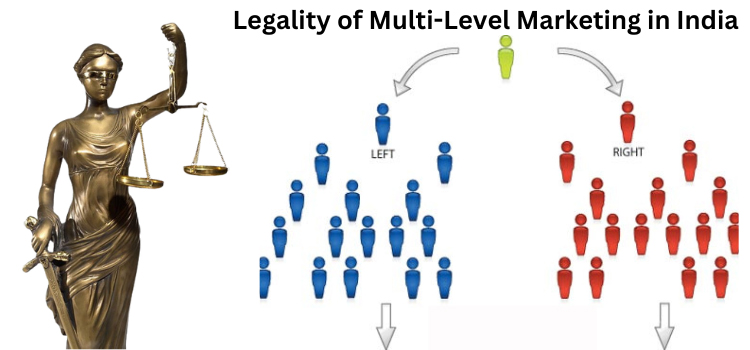Legality of Multi-Level Marketing in India
Posted On : August 4, 2023

Table of Contents
Introduction
With the growth of IT, businesses also tend to follow the same trend up or down the business cycle. With more and more businesses moving online, one area that has seen an exponential growth is Direct Selling. Direct Selling means selling of goods directly to the end consumers without the need of any intermediary or middleman. As per the reports of FICCI and KPMG in 2015, INR 75 billion market in India was of direct selling. There are two ways of direct selling; Single Level Marketing (SLM) and Multi-Level Marketing(MLM). In single level marketing direct sales are made in person to person or door to door but in multi-level Marketing sales are made through a distributor network. In multi-level marketing sellers can recruit more people to sell their products.It is one type of marketing method used by pyramid–structured organizations to sell their services as well as products. In MLM workers are buyers as well as salespersons. Other names of MLM are network marketing, pyramid selling scheme, referral marketing. Major MLM companies in India are MaryKary, Forever Living, Avon, Amway etc. and all these companies occupied Indian market and even gave employment opportunities to unemployed, housewives or retired people.
The main reason why people are engaged in the business of Multi-Level Marketing is flexibility in the work. People have the opportunity to work from any place. As per the research of Direct Selling Association, 90 percent direct sellers work less than 30 hours per week and 50 percent direct sellers work less than 10 hours in a week. MLM business can be started without making much investment. An MLM business does not require long term commitment.
In older times MLM used schemes like Ponzi scheme, Pyramid Scheme, Chit Funds which are illegal as per Direct Selling Guidelines. There are certain illegal schemes in MLM which promises faster return of investment or promises of making huge money without working much and created a negative impact on society.
There are several laws applicable on MLM such as Income Tax Act, Legal Metrology Act, Companies Act, Consumer Protection Act etc. With the passage of time and requirements many changes are made in law and entrepreneurs are generally unaware about the laws which are applicable on MLM which is a big problem for the entrepreneurs to start MLM Business.
Is Multi-Level Marketing (MLM) Legal in India
One question that generally arises when someone wants to start MLM business is whether this business is legal or not? In India MLM is considered to be legal except for a few businesses which trap the customers who invest in such schemes. The Indian government has mentioned a few types of MLM which are considered illegal in India to safeguard the interest of the consumers. The illegal MLM strategies are mentioned in Direct Selling Guidelines 2016 and Prize Chits and Money Circulation Schemes (Banning) Act 1978.Thus, the notion that the Multi-Level Marketing (MLM) business is illegal in India is completely false and wrong.
Multi-Level Marketing Schemes which are considered illegal in India are:
-
Chit Funds
Chit Fund is a kind of lottery system in which every subscriber deposits a certain amount of money in installments for a period of time and any subscriber can take that lump sum money whenever he or she needs the money. One of the chit fund scams is The Saradha Group chit fund scam. In this scam a company was incorporated under the name of Sarada Devi in the year 2006. This company used to attract the investors in West Bengal and avoid Securities Exchange Board of India. In the year 2013 this company went into the losses around 300 crores. The chairman of the group was arrested and investigation are still going on. -
Ponzi Scheme
This scheme is one kind of fraud investment scheme in which MLM promises higher rate of return to the investors. In this scheme single person controls the activities related to fund such as transferring of the funds. -
Money Circulation Scheme
Schemes that assure fast earnings. Sometimes people are asked to invest money in this scheme for making fast money which is illegal in India. -
Pyramid Scheme
In this type of scheme, the employer builds a structure of pyramid and that person represents the tip of pyramid. One person can recruit another to work under him.
Reserve Bank of India said that Pyramid Scheme is fraud and illegal in India.
Example – Amway Scam, Mr. William S Pinckney, Chief Executive Officer of Amway Company, India was arrested as he was involved in Pyramid Scheme. In this scam the prices of the products was high than the maximum retail price and false promises were done to the distributors for fast money in case they sell the product at higher rate. And customers were not purchasing the product at high price and distributors went into loss.
Though MLM is legal in India but there are some fake multi-level marketing in India. So following are differences between Legal and Illegal MLM
- If someone promises higher rate of return then it is Illegal where as Legal Multi-Level Marketing involves actual sales of the products.
- In illegal MLM scheme, commission is paid to the agents. But in case of Legal MLM commission is paid to the distributors.
- In Illegal MLM there is no reason for higher rate of return but in Legal MLM for giving commission there is reason for it.
Laws Governing Multi-Level Marketing (MLM) Businesses in India and Their Legal Compliances.
-
Companies act of 2013
There are certain provisions for MLM under Companies Act,2013 such as the company has to be registered. The details of the company have to be filed in the prescribed form as per the said act. There are many other provisions and MLM have to comply with all the provisions of the Act.
-
Income Tax Act of 1961
The MLM Company have to comply with the rules of Income Tax Act of 1961 and should be registered under the Income Tax Act of 1961. It must have GST Number, PAN Number, TDS and other license as prescribed in the law of its principle place of business. The MLM Company has to file Income Tax Return as per prescribed format and procedure in the Act. In case of failure in filing return MLM have to pay interest and penalty. It has to file GST return also in the prescribed form in Goods and Services Tax Act and has to furnish all the relevant information with the returns.
-
Consumer Protection Act of 1986
MLM companies must have an official website and a portal for consumer grievances. The complaints of consumer registered on the portal must be solved within 7 days from registration of the complaint.
-
Legal Metrology Act of 2009
Certain declarations have to be made on the product which is being sold by MLM. The declarations which are important to be given on prepackaged goods is given in chapter II of Legal Metrology Act. The declarations are as follows-- There must be name and address of manufacturer on the packaging.
- There must be name of country of origin on the packaging of product.
- Details like net quantity, standard weight, manufacturing date etc. must be printed on packaging of product.
Legal Remedy Available to A Victim ofMulti-Level Marketing (MLM) Fraud
There are many Multi-Level Marketing (MLM) Companies who have committed cheating and fraud with their customers, however, the victim has numerous options to report such illegal and unlawful acts.If someone becomes a victim of Multi-Level Marketing (MLM) fraud in India, there are legal remedies available to seek redress. Here are some potential legal actions that can be taken:
-
File a Complaint with Police
The victim can file a complaint with the local police station, providing all relevant details of the MLM fraud. The police may investigate the matter and initiate legal proceedings against the individuals or companies involved.
-
Consumer Complaint
The victim can file a complaint with the appropriate consumer forum or consumer court. The complaint should outline the details of the MLM fraud, including the misrepresentation of products or services, unfair trade practices, or any other violations of consumer rights. The consumer court can order compensation or take other necessary actions against the fraudulent MLM company.
-
Civil Lawsuit
The victim can initiate a civil lawsuit against the MLM company or individuals involved in the fraud. This can be done to seek compensation for financial losses, damages, or any other harm suffered as a result of the fraudulent activities. It is advisable to consult with a lawyer who specializes in consumer law or fraud cases to assess the legal options and pursue the lawsuit effectively.
-
Criminal Proceedings
If the MLM fraud involves criminal elements such as cheating, fraud, or misrepresentation, the victim can approach the police or file a private criminal complaint before a magistrate. The authorities can then conduct an investigation and prosecute the individuals involved in the MLM fraud under relevant criminal laws.
-
Approaching Regulatory Authorities
Depending on the nature of the MLM fraud, the victim can also approach the appropriate regulatory authorities responsible for overseeing MLM activities in India. For instance, in India, the Ministry of Consumer Affairs and the Reserve Bank of India (RBI) have regulatory oversight in certain cases. Registering a complaint with these authorities can trigger an investigation into the MLM company's activities and may result in regulatory action against the fraudsters.
It is important for victims of MLM fraud to gather all relevant evidence, such as contracts, transaction records, communication records, and any other supporting documents that can strengthen their case. Consulting with a lawyer experienced in consumer protection or fraud cases can provide valuable guidance on the available legal remedies and the best course of action based on the specific circumstances.
Few Decided Case Laws Relating toMulti-Level Marketing;
-
Amway India Enterprises vs. Union of India Case No. 20471 of 2006
In this case the Hon’ble Supreme Court observed that there was a scheme which provides faster return of money to the distributor and distributor gets reward of the money and such activity comes under Money Circulation Scheme which is illegal as per the guidelines issued in Direct Selling Guidelines 2016. The judgement of the Hon’ble Supreme Court was based on Guidelines issued by Ministry of Corporate Affairs for Direct Selling Enterprises.
-
Kuriachan Chacko vs. State of Kerala Case No. 17283 of 2016
A Partnership Firm named as M/S Ernakulam was engaged in the business of lottery. The firm introduced a scheme named as LIS Deepasthambham Scheme. In this scheme one has to pay RS 625 in order to purchase single unit of the lottery from the firm and the firm used Rs 350 to purchase 35 lottery tickets from Kerala Government and the person who invested in such scheme will get the double amount of the invested amount. The Hon’ble Supreme Court observed that the scheme provides for faster return of the investment. And this comes under cheating and multi-level marketing which is illegal. The Court further held that it is punishable act under section 420 read with section 34 of Indian Penal Code (IPC) of 1860.
-
State of Bengal vs. Swapan Kr. Guha, Sanchita Investments
In this case a partnership firm was registered with a share capital of INR 7000/- and the firm was engaged in the business of Investment and Finance. FIR was filed on the firm with the allegations that the firm reduced interest rate to 36 percent from 47 percent and the firm was also engaged in money circulation scheme. The Hon’ble Supreme Court held that activity involving fast money return will not come under section 2(c) of the Prize Chits and Money Circulation Schemes (Banning) Act of1978 and stated that the allegations made in FIR is not correct.
-
M/S Apple FMCG Marketing Pvt. Ltd. v. Union of India
In this case the petitioner prayed for a writ of declaration that selling products through the Network Marketing System is legal and not in contravention of the provisions of the Prize Chits and Money Circulation Schemes (Banning) Act, 1978 or any other law.
M/s Apple FMCG Marketing Private Limited was a company registered under the Companies Act, 1956. It marketed various products including shampoo, tea, coffee powder, after-shave lotion, etc. under the brand-name ‘Joy Eternal’ through “network marketing.” The marketing process was carried out directly by recruiting distributors of the products and services. There was no service fee for registration as distributor. Any person who was interested was given a product for the price fixed. The distributors were encouraged to enroll more distributors. The commissions were given only as per the volume of sales made by the individual distributor and his team.
The Court clarified that the scheme creates chain of customers and only when the chain progresses without any break in any of the links, the ‘principal distributor’ gets more commission. If for any reason, the chain is broken, at any stage, then the principal distributor’s commission would get reduced proportionally to that extent. Therefore, it is not correct to say that there is no chain of customers in the process. The contention that no service charge was collected appeared to be incorrect in view of the fact that every person who purchases a kit has to pay a service charge of INR 50 for each kit. From the very fact that 65 per cent is earmarked for paying as commission to the distributors, it is clear that the value of the product is only 35 per cent of the sale price. That is when the goods are sold at Rs. 550/-, the actual value of the goods that are sold is only INR 188.
It further opined that the progress of the chain of customers, at some point in time, will get saturated and the distributor, who purchases the goods, will not find any purchaser/sub-distributor to sell or enroll afresh. At that time, due to the progress of the chain, in the manner stated above, such persons will not find new members may be in lakhs or even millions. Therefore, lakhs or even millions of people are bound to lose their entire money The Court concluded that the so-called Multi-Level-Marketing, though called by a very attractive name, squarely falls within the definition of ‘Money Circulation Scheme’ under the Act. Hence, it is prohibited by the Act. It directed the law enforcing authorities to take appropriate action.
Conclusion
In order to conclude it can easily be said that the Multi-Level Marketing (MLM) or Online Direct Selling business is legal in India. The best legal advice for a person starting or who has a Multi-Level Marketing (MLM) or Online Direct Selling business or is planning to incorporate a Multi-Level Marketing (MLM) or Online Direct Selling business in India is to follow all the legal compliances (as mentioned hereinabove) in their entirety otherwise it will be deemed as an illegal business.























